Primary ITO qualifications set dairy farmers on success pathway
16 August 2022
Farmers building their skills by studying towards qualifications have shone as winners in the recent 2022 New Zealand Dairy Industry Awards.
Of the thirty awards given, 24 were awarded to current or past Primary ITO learners showing that training is leading to success and excellence for learners. Congratulations to our learners for their achievements in the awards and in progressing their mahi. And a huge shout out to the employers who have supported their staff through this training. Read more about each award winner below.
- Jaspal Singh, South Canterbury
- Robyn Maré, Waikato
- Hayden Purvis, Waikato
- Todd and Renee Halliday, Central Plateau
- Thomas Lundman, Bay of Plenty
- Zoe Bryson, Central Plateau
- Scott and Rebecca O'Brien, Galatea
- Kevin and Kyla Freeman, Tasman
- Jimmy Cleaver, Waikato
- Craigmore Farming Services, Canterbury/North Otago
Jaspal Singh, South Canterbury
Winner: 2022 Dairy Manager of the Year
Merit Awards: DeLaval Livestock Management Award; Fonterra Dairy Management Award; Meridian Environmental Sustainability Award
Qualification: New Zealand Apprenticeship in Agriculture (Dairy Farming) (Level 4)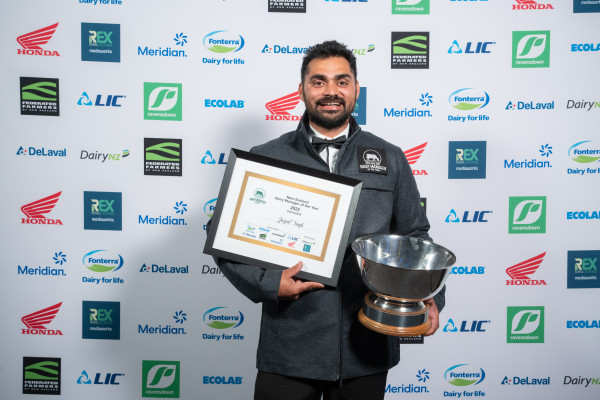
Dairy Manager of the Year winner Jaspal Singh came to Auckland from India to do an IT diploma, but after completing that in 2015, he decided to give working in the dairy industry a try and took a job at a dairy farm.
Jaspal was hooked and began his Primary ITO apprenticeship in Dairy Farming. Now he and wife Ruby are focussed on one day buying their own dairy farm.
Over the past seven years Jaspal has completed four qualifications with Primary ITO and been promoted to Manager of a Waimate dairy farm. Jaspal says it’s a team effort with Ruby working alongside him as a farm assistant, having also completed two Primary ITO programmes.
“Primary ITO has helped us all through this journey. The support has been awesome,” says Jaspal.
Jaspal’s qualifications include the Level 3 Certification in Milk Quality, Level 2 National Certificate in Agriculture (General Skills), Level 3 Certificate in Animal Husbandry and the Level 4 New Zealand Apprenticeship in Dairy Farming. Ruby has completed the Supplementary Credit Programme in Milk Quality Level 1 and the New Zealand Certificate in Dairy Livestock Husbandry Level 3 with Primary ITO.
Jaspal says the study has advanced him to his current role, and he and Ruby have set future goals. “Our goal is to become a farm owner and we are going step by step.”
Next season Jaspal will become a variable order share milker and is looking toward being a 50:50 sharemilker and owning his own cattle in the future, with the ultimate goal of the couple owning their own farm and herd.
He also wants to keep learning and advancing so is planning to study Level 5 Production Management next.
Robyn Maré, Waikato
Runner Up: 2022 Dairy Manager of the Year
Merit awards: Ravensdown Feed Management Award; ANZ Personal Planning & Financial Management Award
Qualification: New Zealand Certificate in Production Management (Level 5)
Robyn has begun contract milking at 480 cows at Pukeatua in the Waikato region after moving from the West Coast.
She says studying with Primary ITO has extended her knowledge and given her a plan for the future.
“My training both on and off farm has given me an understanding of why we do what we do and the confidence to take next steps in my career.”
Robyn says entering the awards was also a good learning experience, prompting her to assess her farm management and future goals in the industry.
Hayden Purvis, Waikato
Third: 2022 Dairy Manager of the Year
Qualification: Completing New Zealand Apprenticeship in Agriculture (Dairy Farming) (Level 4)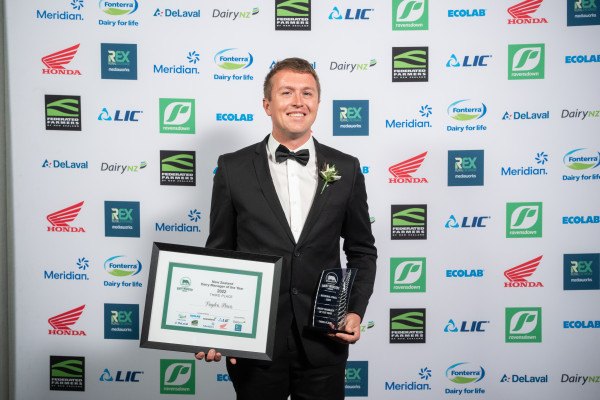
Hayden manages Lakeland Downs Ltd in the Waikato settlement of Ngāhinapōuri milking 800 cows. He previously managed a dairy farm at Galatea, near Whakatane.
He says studying with Primary ITO has helped him to trust his own knowledge and reinforced relevant information he needs to know in an ever-changing industry.
It was important for the younger generation entering the industry to understand how and why things are done, and how what they do affects the farming business and environment.
He also recommended taking part in the awards programme as this required an in-depth review of farming practices and opened opportunities to build connections in the industry.
Todd and Renee Halliday, Central Plateau
Runner Up: Share Farmer of the Year
Merit Awards: Ecolab Farm Dairy Hygiene Award; Meridian Environmental Sustainability Award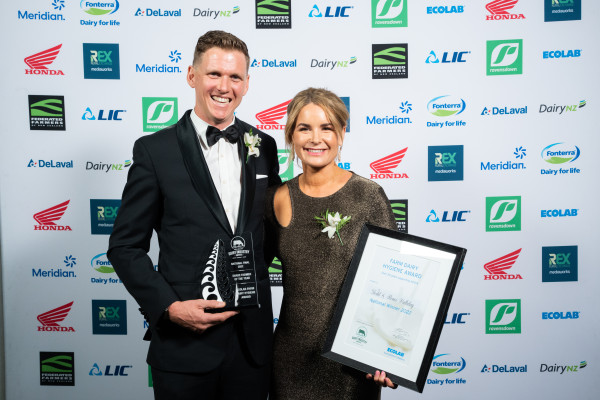
Todd Halliday credits a great deal of the farming knowledge he’s gained over the past 13 years to his study with Primary ITO and its predecessor, along with some great mentors along the way.
After growing up in the city and a lengthy stint of overseas travel with partner Renee, they returned to New Zealand and made a career switch to dairy farming.
They run a hybrid model where they milk 500 Jersey cows, have an equity partnership in the farm and also contract milk.
“I did not have a history in farming. I have been taught through Primary ITO best practice how to farm. I am always open to ideas and technologies and trying to farm the best way possible.”
When they moved to the farm Todd enrolled in a Level 2 programme and continued his study up to Level 5, completing the New Zealand Diploma in Agribusiness Management (now known as the New Zealand Diploma in Primary Industry Business Management).
Now it’s particularly important to Todd and Renee that all their team also learn best practice. “I encourage all my staff to do the study. I am a big advocate for the training.”
He says they entered the awards to push their business to the next level and the judging and feedback has been helpful. The next step and long-term goal for Todd and Renee is to buy out Renee’s parents and own the farm in the future.
Thomas Lundman, Bay of Plenty
Runner up: Dairy Trainee of the Year
Merit Award: DeLaval Communication and Industry Involvement Award
Qualification: Completing New Zealand Apprenticeship – Agriculture (Dairy Farming) (Level 3 and 4)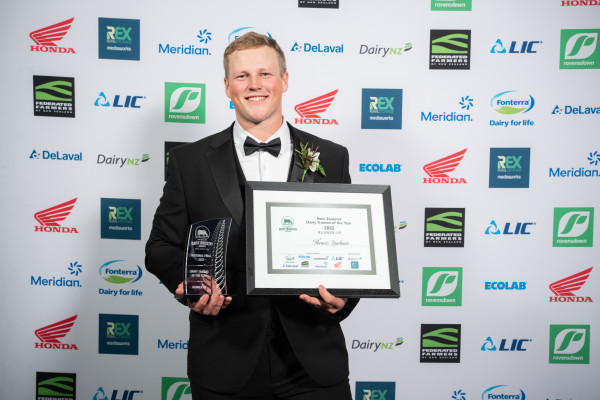
Thomas Lundman had a background working in tourism in Te Anau, and when Covid-19 arrived in New Zealand in 2020, he had been considering either continuing to work in that industry or make a change to farming.
Covid-19 forced him to decide on farming and he took the opportunity of a farm assistant role at a Matamata dairy farm. He hasn’t looked back and says his only regret is that he didn’t switch to the dairy industry sooner.
In his first year his employer encouraged him to apply to enter the Dairy Industry Awards. He followed the judges’ recommendation that he further his knowledge by undertaking Primary ITO training.
Thomas completed the Primary ITO Level 3 Effluent management course and is now working through the Level 3 and 4 New Zealand Apprenticeship in Agriculture – Dairy Farming.
“I am finding the study very good. It is identifying the gaps in my knowledge and that is really useful.”
The study has also prompted Thomas to plan for their future in farming. He and partner Alice have goals to work towards both herd and farm ownership. “We are starting small and are in the process of buying our first 10 in-calf heifers.”
Zoe Bryson, Central Plateau
Third: Dairy Trainee of the Year
Merit Awards: Federated Farmers General Farming Knowledge Award; Best Video Award presented by Streamliner
Qualification: Completing New Zealand Certificate in Production Management (Level 5)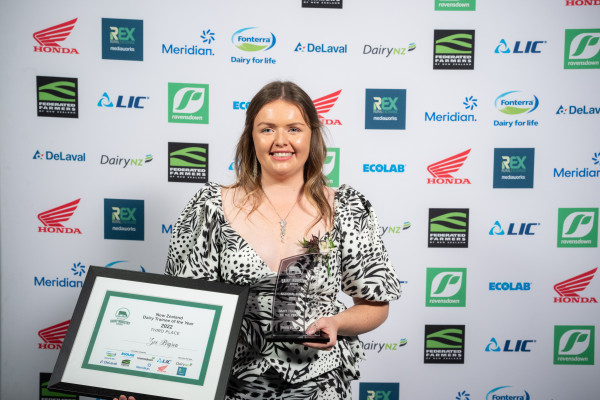
Zoe and her partner Connor are in their first season of 50:50 sharemilking 220 crossbred cows at Ngakuru, south of Rotorua, with Zoe also managing a 280-cow neighbouring dairy farm. In these roles she manages pasture, feed budgeting, animal health and the day-to-day running of the farm.
Zoe says studying Level 5 has provided great resources and information that have extended her ability in her roles. “It has been very beneficial and really challenged my way of thinking.”
She attributes part of her success in the awards to her study with Primary ITO. “My tutors and training advisers have always been very supportive, particularly in the Level 5 programme, my tutor goes the extra mile to help us with any issues in the course work and on the farm.”
Zoe also encourages others to enter the awards. “I have gained a lot of valuable knowledge, met many inspiring people and been able to accelerate my success in the industry from that.”
Scott and Rebecca O'Brien, Galatea
Merit Award: DairyNZ People and Culture Award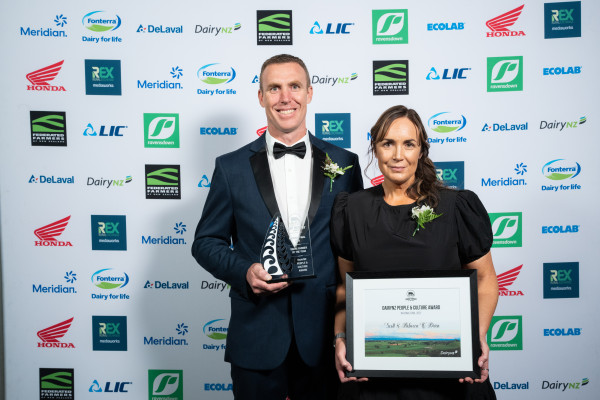
It’s all about growing people, providing opportunities and work life balance for Bay of Plenty dairy farmers Scott and Rebecca O’Brien.
They sharemilk one thousand cows at Galatea after progressing from contract milking to herd management while Scott studied with Primary ITO toward his Level 5 NZ Diploma in Agribusiness Management which he completed in 2017.
Now they have four staff training with Primary ITO and Rebecca says it is important for them to provide their team opportunities to develop and encourage their team to upskill.
Rebecca says with three young children, work-life-balance is important, and having skilled staff enabled the whole team to balance their work with other activities.
Scott and Rebecca’s interest in developing others was sparked when they managed 10 staff at a large trust farm near Taupō several years ago. “That was huge and that was where our passion for people came about. We knew that was our fit.”
“We have got so much passion for people and seeing them grow and stepping up.”
And their focus on their team is working for them. “We have got staff that say they can’t imagine working for anyone else. We could not do it without our people, they are number one at the end of the day.”
Kevin and Kyla Freeman, Tasman
Merit Award: Ecolab Interview Award
Qualification: Completing New Zealand Diploma in Agribusiness Management (Level 5)
(now known as New Zealand Diploma in Primary Industry Business Management)
Kevin and Kyla 50:50 sharemilk 390 cows at Atapo farm in the Nelson/Tasman area and one day look forward to owning the family farm.
Kevin grew up on his parent’s dairy farm and chose building as his career, keeping his hand in farming by investing in carryover cows, until the couple returned to the farm and took up sharemilking five years ago.
They are now in their second season of running their own sharemilking business and herd ownership and are starting to buy into the family farm.
Kevin credits his study with Primary ITO for giving him the knowledge to make informed decisions and measure and monitor the farm’s performance.
“Primary ITO has great tutors and training advisers, and that support ensured I was able to achieve each module and level while I was working.”
Kevin says both the Dairy Industry Awards and Primary ITO provided opportunities to network and share knowledge and ideas with like-minded people who were focused on moving forward in the dairy industry.
“It’s a great experience to be a part of both and I strongly encourage all farm staff to learn and grow with Primary ITO and by entering the awards.”
Kevin and Kyla have long-term goals to own the family farm and build their farm ownership from there.
Jimmy Cleaver, Waikato
Merit Award: LIC Interview Award; DairyNZ People and Leadership Award
Qualification: Completing Effluent Management Planning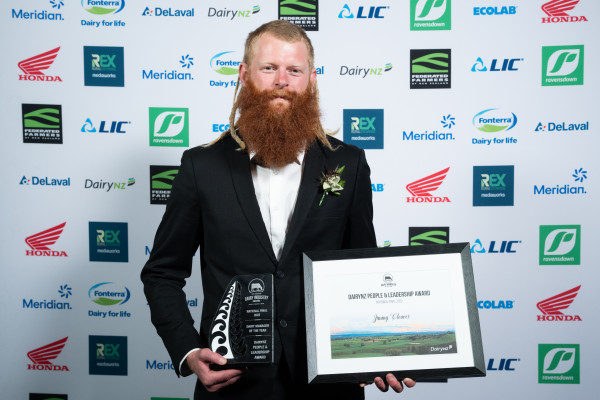 Continued professional development is important to Jimmy Cleaver, who manages a dairy unit Rangiriri just north of Huntly in the Waikato.
Continued professional development is important to Jimmy Cleaver, who manages a dairy unit Rangiriri just north of Huntly in the Waikato.
His first experience of dairy farming was helping out on his grandparent’s farm in the school holidays, and this prompted him to take up a Primary ITO programme which offered work experience one day a week while he was at high school.
He’s continued to study and has a Telford Certificate in Agriculture (with Distinction), from Lincoln University, completed Levels 2, 3 and 5 Primary ITO programmes and a Dairy Masters course.
Jimmy says continuing to study with Primary ITO has educated him in the theory side of dairy farming. “It has extended my knowledge and from there I have been able to apply what I have learnt practically.”
Jimmy has recently bought his first 60 cows and plans to go sharemilking, with a longer-term goal of farm management.
He says taking part in the awards and receiving recognition has also grown him as a person. “it’s given me the confidence to back myself to do anything that I want to do in the industry.”
Jimmy’s fast progress in the industry since leaving school prompted judges to suggest he could encourage other school students into the industry. “I would like to do that. I would like to go out and speak at schools and tell students about the opportunities in this industry and that it is a good career.”
Craigmore Farming Services, Canterbury/North Otago Winner: Fonterra Responsible Dairying Award 2022
Qualifications: Several employees completing PITO programmes 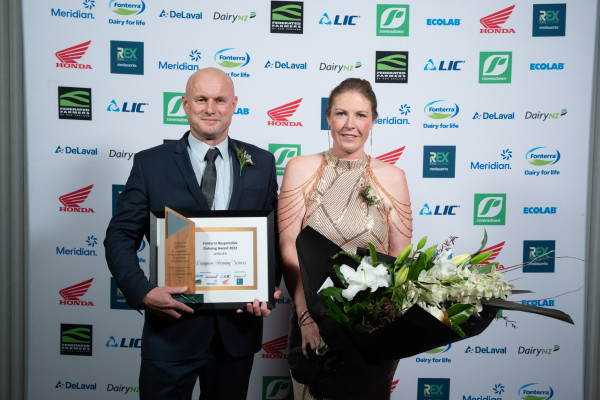 Craigmore Farming Services has multiple employees who work on its 22 dairy farms in the South Island studying towards qualifications with Primary ITO. Enhancing the skills and satisfaction of its people are among a key set of sustainability principles at the core of the Craigmore culture.
Craigmore Farming Services has multiple employees who work on its 22 dairy farms in the South Island studying towards qualifications with Primary ITO. Enhancing the skills and satisfaction of its people are among a key set of sustainability principles at the core of the Craigmore culture.
The company aims to nurture young and talented farmers to aspire to leadership in the New Zealand farming industry. This includes awarding students scholarships and offering staff opportunities for progression to management and minority equity interests.
For more information on the range of Dairy Farming programmes Primary ITO has available, click here.
Entries for the next New Zealand Dairy Industry Awards open 1st October 2022. For more information click here.
